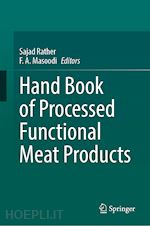
Questo prodotto usufruisce delle SPEDIZIONI GRATIS
selezionando l'opzione Corriere Veloce in fase di ordine.
Pagabile anche con Carta della cultura giovani e del merito, 18App Bonus Cultura e Carta del Docente
Functional food technology aims to boost consumer well-being by providing health benefits beyond that of fundamental nutrition. Meat and meat products have numerous disease-preventing and health-promoting benefits. However, the meat industry has faced many new challenges since the World Health Organization (WHO) studies suggesting that small increases in the risk of several cancers may be associated with high consumption of processed meat. In addition, consumers often associate meat with a negative health image. This negative image of meat is mainly due to fat content such as saturated fatty acids and cholesterol and process induced toxicants like N-nitroso compounds and polycyclic aromatic hydrocarbons (PAHs) and the alliance of these with chronic diseases. In this context, the functional food concept applied to meat processing has gained importance, especially by reduction/replacement of fat, sodium, nitrites, reduction of process induced toxicants and addition of beneficial components such as probiotics and bioactive compounds.
Hand Book of Processed Functional Meat Products provides meat industry professionals with a step-by-step guide to post-mortem muscle chemistry, functional and cultured meat products-design and development, bioactive compounds, reduction of carcinogenic compounds, application of enzymes and nanotechnology, innovation in sensory assessment, authentication and marketing, 3D printing in the development of meat based products and regulatory and consumer challenges in functional meat products. This book differs from other publications on functional meat product processing in that it offers comprehensive coverage and in-depth discussion of the most recent scientific and technological applications in functional meat products. Many meat science and technology books available on the market describe meat chemistry, properties and basic science with only a rudimentary understanding of meat processing, functional meat products development and applications. Therefore, this work will be helpful for food industry professionals, policy makers, researchers, students, teachers and nutritionists and dieticians for a complete and up-to-date overview of functional meats processing and quality evaluation.
Introduction to meat processing industry.- Structure, composition, nutritive value and biochemistry of post-mortem muscle.- Quality requirements of meat for processing.- Processed meat products.- Herbs, spices and condiments for processed meat products.- Introduction to functional meat products.- Design and development of meat-based functional foods.- Reduced and low fat meat products.- Probiotic meat products.- Low salt meat products.- Nitrite reduction or replacement in processed meat products.- Natural antioxidants and antimicrobials in processed meat products.- Application of enzymes in processed meat products.- Cultured meat.- Reduction of carcinogenic N-nitroso compounds and polycylic aromatic hydrocarbons (PAHs) in processed meat products.- Nanotechnology in meat processing industry.- Current techniques and technologies of meat quality evaluation.- Innovation in sensory assessment of processed meat products.- Authentication of processed meat products.- Market, regulatory and consumer challenges of functional meat products.- Advances in production of low fat meat products.- 3D printing in the development of meat based products.- Valorization of meat waste and by-products.- Environmental issue of meat.
Dr. Sajad A. Rather is a Food Safety Officer at Food and Drugs Administration, Jammu and Kashmir, India.
Dr. F. A. Masoodi is a Professor of Food Technology at University of Kashmir, India











Il sito utilizza cookie ed altri strumenti di tracciamento che raccolgono informazioni dal dispositivo dell’utente. Oltre ai cookie tecnici ed analitici aggregati, strettamente necessari per il funzionamento di questo sito web, previo consenso dell’utente possono essere installati cookie di profilazione e marketing e cookie dei social media. Cliccando su “Accetto tutti i cookie” saranno attivate tutte le categorie di cookie. Per accettare solo deterninate categorie di cookie, cliccare invece su “Impostazioni cookie”. Chiudendo il banner o continuando a navigare saranno installati solo cookie tecnici. Per maggiori dettagli, consultare la Cookie Policy.